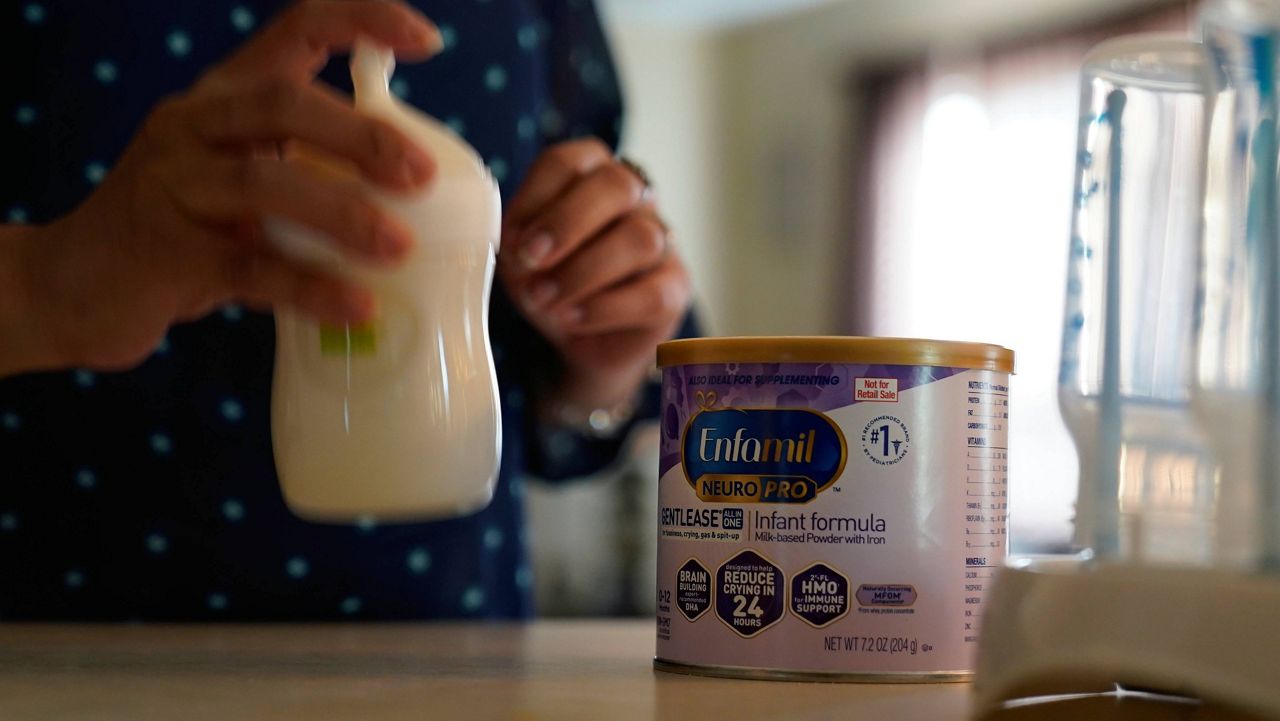House Democrats unveiled a $28 million emergency spending bill Tuesday to address the shortage of infant formula in the United States.
"For the babies...that's the centerpiece of all of this now," Speaker of the House Nancy Pelosi told reporers at a press conference Tuesday. "Our babies, the nutrition they recieve when they are very young, has such an impact on their entire lives."
What You Need To Know
- House Democrats have unveiled a $28 million emergency spending bill to address the shortage of infant formula in the United States
- Rep. Rosa DeLauro, the chair of the House Appropriations Committee, says the bill would help the Food and Drug Administration take important steps to restore the formula supply in a safe and secure manner
- Supporters say the money would increase FDA staffing focused on the formula shortage to boost inspections, prevent fraudulent products from getting onto store shelves and acquire better data on the marketplace
- The House is expected to take up the emergency spending measure later this week
Rep. Rosa DeLauro, the Democratic chair of the House Appropriations Committee, said the bill would help the Food and Drug Administration take important steps to restore the formula supply in a safe and secure manner.
The funding would increase FDA staffing focused on the formula shortage to boost inspections, prevent fraudulent products from getting onto store shelves and acquire better data on the marketplace, lawmakers said.
"The crux of this is providing infrastructure, if you will, in order to do what needs to get done, and that is about, as quickly as possible, how we get product in and get it on the shelves," DeLauro told reporters at a press conference Tuesday.
The shortage stems from a February recall by Abbott Nutrition that exacerbated ongoing supply chain disruptions among formula makers, leaving fewer options on stores shelves across much of the country. DeLauro has also been critical of the FDA for a failure to address "with any sense of urgency" the safety concerns at Abbott's plant in Michigan that prompted the shortage.
"The stories of mothers and fathers struggling to find formula and the images of empty store shelves are heartbreaking," DeLauro said. "Parents and caretakers across the country cannot wait. They need our support now."
Abbott is one of only a handful of companies that produce the vast majority of the U.S. formula supply, so their recall wiped out a large segment of the market. Federal regulators reached a deal this week to allow the company to restart the Michigan plant, but Abbott said it will take eight to ten weeks before new products begin arriving in stores.
The House Appropriations Committee will hear from FDA Commissioner Robert Califf on Thursday to discuss the agency's budget. Lawmakers are expected to focus much of the discussion on the formula shortage. A panel is also expected to have a second hearing featuring experts who will discuss the recall of infant formula produced at the Abbott facility and the FDA's handling of the recall.
The House is expected to take up the emergency spending measure later this week before lawmakers head back to their congressional districts for the next two weeks. The bill would also need approval in an evenly divided Senate, where it will need support from at least 10 Republicans before it could be signed into law.
"When we vote on this legislation, I hope my Republican colleagues will be filled with what Shakespeare called 'the milk of human kindness.' Today, he may say 'the milk of human health,' or 'the milk of human survival,'" House Majority Leader Steny Hoyer told reporters. "I hope my colleagues will join with us to move swiftly in addressing this pressing challenge."
Meanwhile, the FDA is looking to boost imports by streamlining its review process to make it easier for foreign manufacturers to begin shipping more formula into the U.S.
Swiss conglomerate Nestlé said Tuesday it had already increased production and moved up planned shipments to the U.S. to alleviate the shortages. Nestlé is also rushing the shipments via air.
Nestlé said it prioritized the shipment of two products that it was already importing — Gerber Good Start Extensive HA from the Netherlands and Alfamino from Switzerland — because they serve a critical need. The products are made for babies who are allergic to cow's milk.
Nestlé said it is reviewing the new guidance from the FDA, which temporarily relaxes import restrictions on baby formula, and it might start importing more varieties.
"We are reviewing the guidance and assessing where we may be able to tap into the Nestlé global nutrition network to help," a company spokesperson said in a statement.
Also at Tuesday's press conference, Sen. Debbie Stabenow, D-Mich., and Rep. Jahana Hayes, D-Conn., announced a separate bill that would focus on the Supplemental Nutrition Program for Women, Infants and Children — or WIC — to help families find needed formula.
"WIC recipients utilize formula at a rate double most other people in this country; about 50% of our babies rely on the WIC program for milk," Hayes told reporters. The Access to Baby Formula Act would provide a waiver to families to purchase formula that is safe and available, rather than restricting which brands and types of formulas WIC recipients may purchase.



